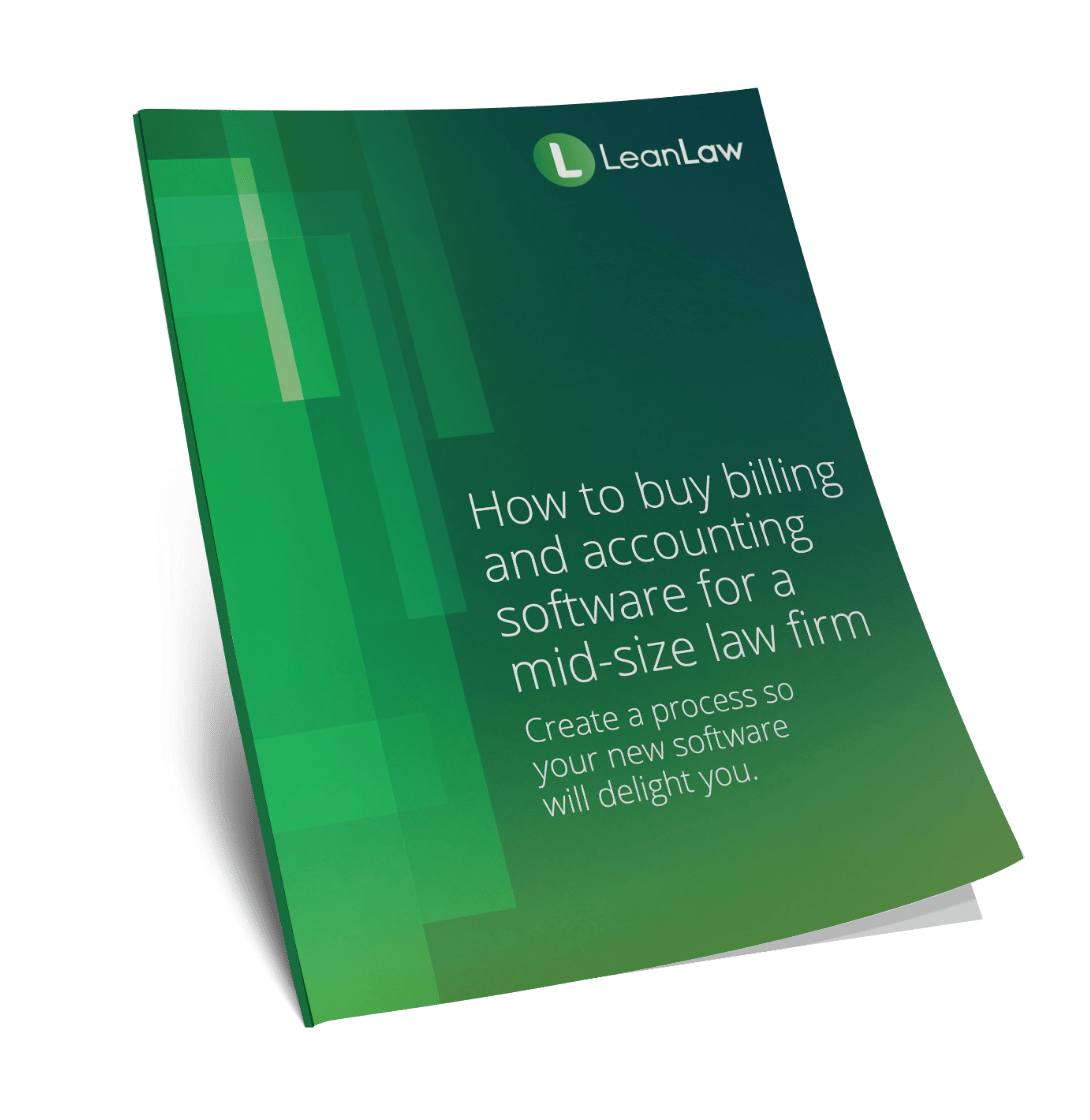
Trust accounting – it’s a topic that can make even the most seasoned lawyer’s head spin.
As legal professionals, we know that meticulous financial management is paramount, especially when it comes to handling client funds.
But let’s face it…trust accounting can be a labyrinth of rules, regulations, and potential pitfalls, particularly for those who had no interest in crunching numbers for a profession in the first place.

Key Takeaways
- Trust accounting is one of the most complicated and crucial parts to law firm management.
- Knowing the dos and don’ts of proper trust accounting will go a long way in helping your firm establish best practices when it comes to handling client funds and make sure those practices are in compliance with the rules and regulations in your firm’s jurisdiction.
- Having the right trust accounting software can help ensure that your trust funds are being managed correctly and will create an environment of trust between you and your clients.
Trust accounting is a critical aspect of running a law firm. It involves managing and safeguarding client trust accounts in a way that will ensure compliance with legal and ethical obligations while also making sure that your clients know exactly how their trust account funds are being handled and can easily access accurate reports regarding their trust transactions.
However, navigating trust accounting can be complex and challenging, with the potential for serious consequences if mistakes are made.
Having a solid checklist of the “dos” and the “don’ts” when it comes to law firm trust accounts can make a big difference in the amount of time, headaches and potential pitfalls that client trust account management can create.
The dos and don’ts of attorney trust accounting…it may be different than you think!

Trust Account Management 101: What is an Attorney Trust Account and Why Does it Matter to Me?
As a lawyer, understanding the concept of an attorney trust account is crucial to your professional responsibilities as well as your relationship with your clients.
An attorney trust account, also known as a client trust account or escrow account, is a designated account where you hold client funds on behalf of your clients.

These funds can include retainers, settlements, court-awarded damages, or any other funds entrusted to you by clients for specific legal matters.
Sometimes, client funds will be held in a pooled trust account, meaning that individual client balances are combined into a single account managed by the law firm. (This approach can be particularly beneficial when you are dealing with a large volume of smaller client’s funds or you are only holding them for a short amount of time.)
Other times client funds will be held in their own separate account when there is a significant amount of money involved or when it is required by specific trust accounting rules and regulations.

Step-By-Step Process for Attorneys & Law Firmsto Buy Law Firm Software
Understand who needs what and prioritize features as you investigate new software. Download Buyers Guide eBookBut regardless of how a firm holds a client’s money, the purpose of an attorney trust account is the same. It serves to keep client money separate from your firm’s operating account and thus act as a financial safeguard to protect the interests of your clients and maintain their trust and confidence in your legal services.
Bottom line?
Proper management of trust accounts is not only an ethical obligation but also a legal requirement in most jurisdictions.
What is the Difference Between Client and Business Accounts for Law Firms?
In order to understand law firm trust accounting, it’s crucial to understand the distinction between client accounts and business accounts.
Client accounts, as the name suggests, are dedicated accounts used to hold client funds.
These funds belong to clients and should never be commingled with the law firm’s operational funds. Client accounts are subject to strict regulations and guidelines to protect the interests of clients and maintain their trust in the legal system.
On the other hand, business accounts are used to manage the operational expenses and finances of the law firm itself.
These accounts encompass the day-to-day financial activities of the firm, such as paying salaries, rent, utilities, and other operational expenses.

Unlike client accounts, a business account is not subject to the same level of scrutiny and regulations as is a bank account that holds client funds.
Maintaining a clear separation between client accounts and business accounts is vital for ensuring the integrity of the trust accounting system.
This vital separation helps to avoid commingling of any of your law firm’s funds, prevents conflicts of interest from cropping up, and allows for accurate tracking and reporting of all your practice’s funds.
By properly segregating client and business accounts, law firms can enhance transparency, accountability, and compliance with trust accounting rules.
Trust Accounting for Law Firms: The Dos
When it comes to trust accounting for law firms, there are certain “dos” that every firm should follow to ensure compliance, accuracy, and transparency.

Here are some of the big ones:
1. Do Separate Client and Firm Funds: One of the fundamental principles of trust accounting is keeping client funds separate from firm funds. Maintain separate trust bank accounts for each client to avoid commingling funds and ensure accurate record-keeping.

2. Do Maintain Accurate and Detailed Records: Accurate record-keeping is crucial in trust accounting. Keep detailed records of all transactions, including deposits, disbursements, and transfers. Ensure that each entry is clearly documented, indicating the purpose and source of the funds.
3. Do Reconcile Trust Accounts Regularly: Regular reconciliation of trust accounts is essential to identify any discrepancies or errors promptly. Reconcile your trust accounts on a monthly basis, comparing your records with bank statements to ensure they align.
4. Do Conduct Internal Audits: Performing internal audits periodically can help detect any irregularities or potential compliance issues. Review your trust accounting procedures, examine transaction records, and verify that all funds are accounted for accurately.
5. Do Implement Proper Segregation of Duties: Establish a system of checks and balances within your firm to prevent fraud or errors. Assign different individuals to handle various aspects of trust accounting, such as receiving funds, recording transactions, and reconciling accounts.
Trust Accounting for Law Firms: The Don’ts
Though “the dos” of trust accounting are important, most experts and legal professionals would agree that knowing the “don’ts” are equally crucial, if not more so.
Understanding the pitfalls and common mistakes to avoid can help law firms steer clear of compliance issues, financial errors, and potential legal repercussions.
Let’s look at what you don’t want to do:
1. Don’t Use Trust Funds for Firm Expenses: Trust funds should be used exclusively for their intended purpose – to benefit the client. Avoid using trust funds to cover firm expenses, even if you plan to reimburse them later. This practice is unethical and can lead to severe legal and professional consequences.
2. Don’t Delay Deposits: Promptly deposit client funds into the appropriate trust account. Avoid holding onto client funds for extended periods as it can create trust accounting issues and may be deemed a violation of trust accounting rules.
3. Don’t Commingle Funds: Commingling client funds with firm funds is a grave violation of trust accounting principles. Keep client funds separate from firm funds at all times, and avoid using trust accounts as a general operating account for the firm.

4. Don’t Neglect Reconciliation: Neglecting to reconcile trust accounts regularly is a recipe for financial chaos. Failure to identify discrepancies or errors promptly can lead to inaccurate financial reporting and potential violations of trust accounting regulations.
5. Don’t Forget Compliance with Trust Accounting Rules: Familiarize yourself with the specific trust accounting rules and regulations applicable in your jurisdiction. Stay updated on any changes or amendments to ensure your firm remains compliant at all times.
Schedule a demo
By adhering to these dos and don’ts of trust accounting, law firms can establish strong financial management practices that prioritize accuracy, transparency, and compliance.
The Biggest “Do” of All: LeanLaw Legal Accounting Software
No matter how much we simplify it, trust accounting can be complex.

To streamline and enhance trust accounting processes, law firms can leverage technology solutions specifically designed for legal accounting.
One such solution is LeanLaw, a comprehensive legal accounting software that integrates seamlessly with platforms like QuickBooks Online.
LeanLaw simplifies trust accounting by automating various tasks, such as tracking client funds, generating invoices, and reconciling accounts.
Its user-friendly interface and intuitive features make it easy for law firms to manage trust accounts efficiently and accurately.
If you want a trust accounting software for lawyers that can make the dos and don’ts of trust accounting easier to tackle, take a look at our free demo to decide if you think LeanLaw can be the right solution for you.




